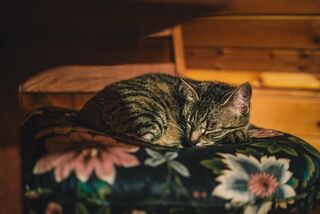Sleep
Insomniac or Short Sleeper?
Short sleepers get less than 6 hours of sleep but don't suffer from insomnia.
Posted June 30, 2021 Reviewed by Kaja Perina
Key points
- There are individuals who regularly get less than 6 hours of sleep but do not seem to have symptoms of insomnia.
- Research is being conducted to understand how such individuals are able to function so well with so little sleep.
- Genetic factors have emerged as a likely explanation.
- Short sleep that does not result in negative health outcomes could be adaptive to life in the postmodern world.

Humans, it goes without saying, are not like cats. At least as far as sleep. Our furry friends spend a great deal of time sleeping and are able to nap at any time. Humans do best when we have a consolidated period of sleep, preferably at night. For many people, however, getting enough sleep is problematic due to the demands of long work hours, insomnia, or just not protecting enough time for sleep. Lack of sleep results in daytime consequences such as fatigue, irritability, low mood, and memory problems. But there seem to be some people who get by on little sleep with no daytime difficulties.
The effects of different lengths of sleep have been researched for decades. Hartmann (1973) found that while the total amount of sleep may differ among long sleepers, short sleepers, variable sleepers, and insomniacs, the amount of deep sleep was similar while lighter stages of sleep varied more. This is consistent with our understanding that deep sleep is most important for the restorative effect of sleep and when we get reduced amounts of sleep, we make up for it by sleeping deeper. When deprived of a night of sleep the proportion of deep sleep will increase on the recovery night so the lost time does not need to be made up hour for hour.
Classic Studies Involving Short Sleepers
An early study of college students with short sleep of 5.5 hours or less were compared to long sleepers who averaged 9.5 hours or more per night. No differences were found in personality, health, or academic performance but sleep EEG recordings showed that the short sleepers got less light stage 2 and REM sleep than the long sleepers (Webb, 1971). This study did not show that short sleepers had no negative consequences but did show that students who had self-selected short sleep schedules did not seem to suffer significant consequences, as would be expected for students who had short sleep due to insomnia or external time demands.
There has been confusion regarding the term “short sleeper” in the scientific literature, by healthcare professionals, and by the general public. Historically, studies have included both those suffering negative consequences of getting too little sleep and those with less need for sleep (Grandner et al, 2010). The health consequences of short sleep caused by insomnia or insufficient sleep has been linked to negative outcomes such as increased coronary artery calcification, weight gain, and impaired cognitive functioning. It appears that true short sleepers may not experience these outcomes.
Most people are short sleepers because of life style and work requirements. Full time workers in the United States getting less than 6 hours of sleep per night increased significantly between 1975 and 2006 (Knutsonet al, 2010). Given that we had the Great Recession and the Covid-19 pandemic since then, it is likely that getting 6 hours or less of sleep has only increased. A study by Brunetti et al (2016) showed that among adolescents, phone and computer use as well as videogame time greater than 2 hours per day were associated with decreased sleep and increased daytime sleepiness.
The International Classification of Sleep Disorders, Third Edition, lists “short sleeper” under the category of Insomnia as one of the “Isolated Symptoms and Normal Variants”. It defines short sleepers as individuals who “routinely obtain less than six hours of sleep per night on average yet have no sleep/wake complaints” (American Academy of Sleep Medicine, 2014). Since they show no obvious daytime dysfunction and do not complain of sleep difficulties they are consider to be normal short sleepers. Short sleep appears to be a constitutional disposition to needing less sleep and is not due to insomnia or insufficient sleep time.
Famous And Up All Night: History's Short Sleepers
In the recent past it was fashionable for many to brag about how much work they did and how little sleep they got. Indeed, a number of famous people are remembered for their ability to work relentlessly on little sleep. Google Answers lists some well-known people who have claimed to be short sleepers including Florence Nightingale, Madonna, Napoleon, Bill Clinton, Winston Churchill, Nikola Tesla, and Margaret Thatcher. Quite a list, if accurate!
Of course, true short sleepers don’t need naps to function well and it could be that some of them used naps to cope. (This appears to be the case for Churchill who was a strong believer in the usefulness of naps. I can imagine Churchill instructing his staff to “hold the calls from Roosevelt and have a scotch and cigar ready when I am done.” Probably not, but who knows.) It’s said that Bill Clinton was a short sleeper but felt that his worst mistakes occurred when he was overly tired. Ms. Thatcher was reputed to have a pretty negative mood, as sleep deprived individuals tend to have, and went on to develop dementia, which has been associated with chronic sleep deprivation although her dementia was attributed to having had strokes. So, some of these famous people may have been true short sleepers, some may have exaggerated their need for little sleep, some got by with judicious use of naps, and some may have just pushed through with sleep deprivation and paid the price for it.
There is some evidence that cognitive behavioral therapy for insomnia interventions can be used to increase sleep in short sleepers who do not identify as insomniacs (Hartescu et al, 2020). In this study a sample of short sleepers who did not have an insomnia complaint but who were overweight were provided with a six week program of standard cognitive and behavioral strategies. There was good adherence to the program and there were significant improvements in total sleep time with reductions in fasting insulin and improvements in blood pressure. Because the intervention resulted in increased total sleep time it seems unclear whether this group was comprised of true short sleepers.
Genetics And Sleep Patterns
The suspicion has long existed that true short sleepers have a genetic disposition to short sleep. There is now evidence that this is true and some estimates indicate that genetically short sleepers comprise about 5% of the population, although this may be an overestimate. Harbinson et al (2017) demonstrated that certain engineered mutations in fruit flies (Drosophila melanogaster) resulted in flies with very short or very long sleep patterns. Interestingly, lifespans of either did not significantly differ from those of control flies. Yes, fruit flies have provided a great deal of information on sleep and have frequently been used in sleep research.
An important study by Shi et al (2019) identified a gene that results in short sleep in humans. A mutation in the beta adrenergic receptor gene was discovered in humans requiring fewer hours of sleep than most. These genes are highly expressed in areas of the brain where neurons are active during REM sleep and wakefulness. This gene was then studied in transgenic mice to better understand its effect. These mice showed short sleep behavior just like the humans. (Some interesting background on the study can be found in this New York Times article.)
While we typically believe that short sleep is genetically determined, there is a case report by Seystahl et al (2014) on a patient who underwent surgery to relieve pressure on the anterior third ventricle due to chronic hydrocephalus and experienced a significant decrease in need for sleep. This patient went from needing 7 to 8 hours of sleep per night to only needing 4 to 5 hours afterward and their mood remained euthymic and they had good daytime functioning. This suggests that certain, as yet not understood, factors other than genetic ones could induce short sleep.
It seems that for some individuals short sleep, rather than being harmful, may be adaptive with these individuals having brains that wake easier, stay awake longer, and don’t suffer negative consequences. These findings may hold the potential for the development of new drugs or other medical or behavioral interventions to target sleep disorders. Indeed, given the increasing pressures and demands of life in the highly technological postmodern era one has to ask - could there be evolutionary pressures toward short sleep? Would being genetically programmed for short sleep actually confer a natural selection benefit? These are exciting and important issues for which research is only starting.
References
American Academy of Sleep Medicine. (2014). International classification of sleep disorders, 3rd ed. Darien, IL: American Academy of Sleep Medicine.
Brunetti, V.C., O'Loughlin, E.K., O'Loughlin, J., Constantin, Étienne Pigeon, E. (2016).Screen and nonscreen sedentary behavior and sleep in adolescents, Sleep Health, 2(4), 335-340, ISSN 2352-7218, https://doi.org/10.1016/j.sleh.2016.09.004.
Grandner, M. A., Patel, N. P., Gehrman, P. R., Perlis, M. L., & Pack, A. I. (2010). Problems associated with short sleep: bridging the gap between laboratory and epidemiological studies. Sleep medicine reviews, 14(4), 239–247. https://doi.org/10.1016/j.smrv.2009.08.001
Harbison ST, Serrano Negron YL, Hansen NF, Lobell AS (2017) Selection for long and short sleep duration in Drosophila melanogaster reveals the complex genetic network underlying natural variation in sleep. PLOS Genetics, 13(12): e1007098. https://doi.org/10.1371/journal.pgen.1007098
Hartescu, I., Morgan, K., Stensel, D.J., Thackray, A.E., & King, J.A. (2020). Are Short Sleepers Uncoupled Sleepers?, Sleep, 43, Issue Supplement 1, A206, https://doi.org/10.1093/sleep/zsaa056.536
Hartmann, E. (1973). Sleep requirement: Long sleepers, short sleepers, variable sleepers, and insomniacs. Psychosomatics: Journal of Consultation and Liaison Psychiatry, 14(2), 95–103. https://doi.org/10.1016/S0033-3182(73)71362-1
Knutson, K. L., Van Cauter, E., Rathouz, P. J., DeLeire, T., & Lauderdale, D. S. (2010). Trends in the prevalence of short sleepers in the USA: 1975-2006. Sleep, 33(1), 37–45. https://doi.org/10.1093/sleep/33.1.37
Seystahl K; Könnecke H; Sürücü O; Baumann CR; Poryazova R. (2014). Development of a short sleeper phenotype after third ventriculostomy in a patient with ependymal cysts. Journal of Clinical Sleep Medicine, 10(2):211-213.
Shi, G., Xing, L., Wu, D., Bhattacharyya, B.J., Jones, C.R., McMahon, T., Chong, S.Y.C., Chen, J.A., Coppola, G., Geschwind, D., Krystal, A., Ptacek, L.J., & Fu, Y. (2019). A Rare Mutation of β1-Adrenergic Receptor Affects Sleep/Wake Behaviors. Neuron, 103(6), p 1044 – 1055. doi.org/10.1016/j.neuron.2019.07.026
Webb, W.B. & Friel, J. (1971). Sleep stage and personality characteristics of "natural" long and short sleepers. Science, 171(3971), 587-588. DOI: 10.1126/science.171.3971.587




